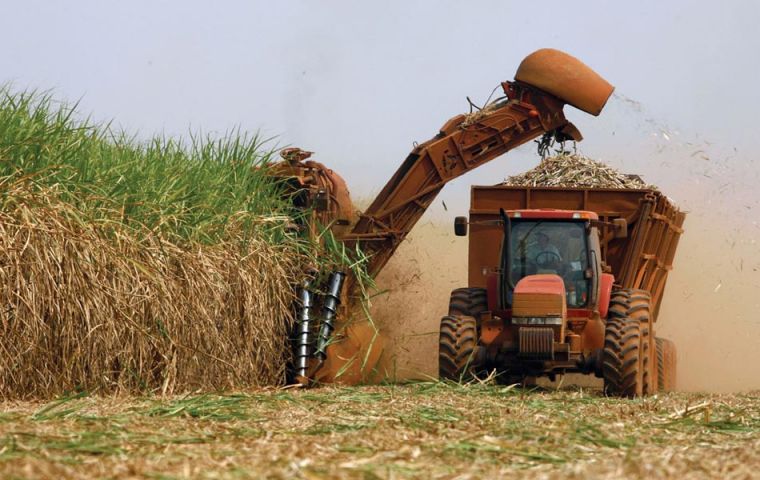MercoPress. South Atlantic News Agency
Shell moves heavily into bio-fuels from sugar cane bagasse in Brazil
 Brazil is one of the world’s leading producers of sugar cane and bio-fuel
Brazil is one of the world’s leading producers of sugar cane and bio-fuel Royal Dutch Shell Plc, the world’s biggest distributor of bio-fuels, is shifting research to waste from sugar-cane farming after ending an algae project in Hawaii. Shell, Iogen Corp. and Codexis have been researching enzymes to produce cellulose ethanol from wheat stalks and sugar-cane bagasse, a sugar industry waste product.
The Anglo- Dutch company has set up a 12 billion USD venture with Cosan SA Industria & Comercio to produce and market traditional sugar- cane ethanol in Brazil, where it’s used to fuel cars.
“Brazil still leaves a lot of plant material on the fields to burn” Mark Williams, downstream director at Shell, said in an interview. “The idea is to apply this technology with existing plants or next to existing plants” and to “accelerate the application of these things, if they work technically, by a substantial fraction.”
The Hague-based Shell, Europe’s largest oil company by market value, expects the share of renewable energy in transport fuels worldwide to double over the next 10 years. In January, Shell exited its Cellana algae bio-fuel research joint venture in Hawaii that was formed in 2007 with closely held algae bio-fuels company HR Bio Petroleum.
“It just wasn’t getting adequate yields to be sensible to continue,” Williams said. Some other companies such as Exxon Mobil Corp. are continuing research in bio-fuels from algae.
Shell and Cosan, which controls the world’s largest sugar- cane processor, last year agreed to combine ethanol-making and fuel distribution assets in Brazil. Shell agreed to contribute about 1.6 billion USD of cash and assets including 2,740 service stations, while Cosan put up 23 cane-crushing mills, 1,730 gas stations and other assets.
Shell has also contributed its shares in Codexis and Iogen Energy to the partners’ venture, called Raizen SA, which is worth 12 billion US dollars, Williams said.
“The initial position of the venture will be that its actually remain short of ethanol and we have to buy ethanol locally in Brazil to meet needs,” he said. “The ambition is to grow the ethanol output of the venture and if arbitrage opens globally there’s opportunity to trade Brazilian ethanol in Europe or in the U.S.”
Raizen’s ethanol annual output will more than double to 5 billion litres within five years, Chief Executive Officer Vasco Dias forecast in February.
The cellulosic ethanol technology will let Shell and Cosan further grow fuel output in Brazil. The partners need to scale the process to a pilot project from a demonstration plant to see if it works and that may take as long as five years. If successful, industrial-scale production may start by the end of the decade, according to Shell.
“The technology even hasn’t been scaled to this sort of magnitude,” Williams said. “We have more work to do”.




Top Comments
Disclaimer & comment rules-

Read all commentsCrops need nutrients, nutrients make sugar, sugar is exported, brash is burned, *some* nutrient returns to the soil.
Apr 09th, 2011 - 10:07 pm 0Shell will use brash (bagasse) to make ethanol; less nutrient will be returned to the soil. Artificial fertiliser will be needed, costed, bought, imported, and spread after every harvest.
The nett worth of the ethanol will take account of the always increasing cost of fertiliser. [Interestingly, fertiliser can be made from oil]. There is good research on the total economic cost and real nett economic benefit of alternative use of nutrients and their transformation products.
The first thing the Brasilian Government should do is instruct its ministry/research institute of agricultural economics to research with Shell the agro-economic outcomes of different projected activities, because the cost/benefit balances will allow a buy-in price for Shell and a calculated Government financial benefit flow from the preferred option. Environmental Impact Analysis - including soil degradation, leaching, run-off and erosion - will be a key part of the equation.
Commenting for this story is now closed.
If you have a Facebook account, become a fan and comment on our Facebook Page!